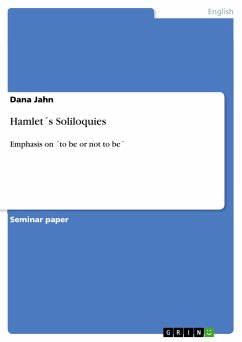Seminar paper from the year 2013 in the subject English Language and Literature Studies - Literature, University of Oslo, language: English, abstract: William Shakespeare's play "Hamlet" is full of intrigues from beginning to end. One could try to generalise Hamlet, Claudius and Laertes as perpetrators; Ophelia, Gertrude, Polonius and others as victims. Although this distinction is not unambiguous, since Hamlet, Claudius and Laertes are also victims, Polonius the henchman of Claudius and Gertrude at least morally questionable. The tragic ending of the play, where almost all the main characters (Hamlet, Laertes, Gertrude and Claudius) are killed, is a touchstone of corruption.We find corruption mainly in the act of taking and planning the act of vengeance. Claudius' "self-defence" against Hamlet becomes a source of corruption, too, when he realises how Hamlet could threaten his throne. In the beginning he is well-disposed towards Hamlet, calls him his son and confirms him as successor of the throne. Hamlet does not respond positively to these seemingly sympathetic overtures, since he envisions his "war" against Claudius, if not life in general as an endless struggle played by unfair rules: "Th'oppressor's wrong, the proud man is contumely," (3.1.71). Hamlet is upset with his own fate and the world order in general. He even calls all of Denmark a prison (2.2.243). Claudius as king is a formidable opponent, forcing Hamlet to use all his wits to entrap him, even in the wake of considerable loss of life as the play progresses.








